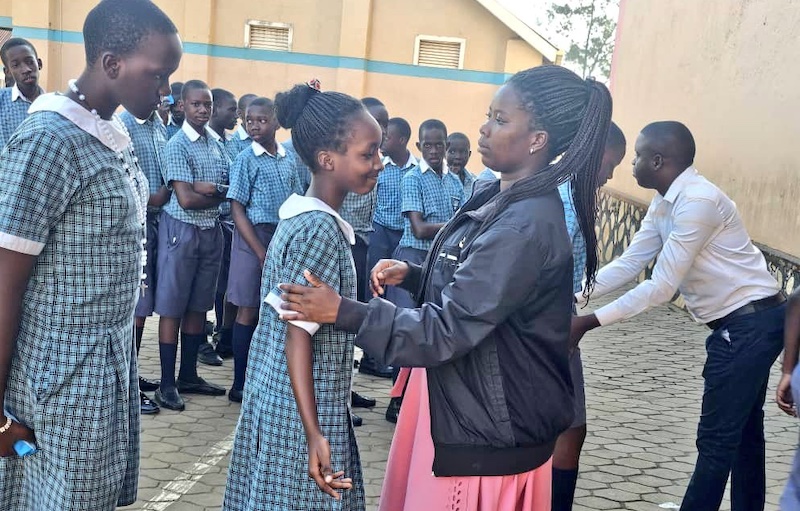
When dawn broke on Monday, the first day of Uganda’s Primary Leaving Examinations (PLE), thousands of pupils dressed in fresh uniforms and holding sharpened pencils and pens filled classrooms across the country.
But in places like Katakwi, Bukedea and Kapchorwa, the morning unfolded differently; muddy roads, flooded bridges, and stranded exam trucks replaced the usual hum of exam-day anticipation. In Katakwi district, rain-swollen rivers turned dirt roads into impassable swamps.
“Floodwaters had isolated several schools,” said Daniel Alileng, the senior district inspector of schools. In Magoro sub-county, some schools could only be reached by boat. “We considered using canoes to deliver examination materials,” he added, with a tone of both frustration and resolve in his voice.
Okwamemor and Alengot St. Paul primary schools in Ngariam sub-county, and Palam and Nathereth in Usuk sub-county, were among those stranded. Uneb, the national examinations board, acknowledged the delays and allowed flexible start times, a rare but necessary concession in a country where weather often dictates the rhythm of public life.
In Bukedea district, pupils from Akaakat primary school had to be relocated to Kamutur primary after the road to their original center vanished beneath a torrent of red mud.
“It’s a challenge every year when exams coincide with heavy rains,” said District Education Officer Stephen Okurut. “We tell headteachers to use boda bodas where vehicles can’t pass.”
It’s a risky, muddy lifeline that keeps the national exam machine moving. In Kapchorwa, exam papers didn’t reach schools until well past 9am.
“Our invigilators arrived at 7am. sharp,” said headteacher of Stephen Munerya of Kapchorwa primary school. “The candidates were ready, but we sat waiting for papers that hadn’t left the police station nearby.”
At Elgon primary school, the situation was similar; candidates stood outside classrooms, watching the rain fall. Exams eventually began at 9:35am. Further uphill in Kween district, landslides forced authorities to merge three schools—Benet, Kere and Kwosir— into one center.
“My school was chosen because it’s on safer ground,” said Benet’s headteacher, Carlos Toskin.
“We couldn’t risk the children’s safety.” Over 100 pupils from the highlands are now sitting together, the landslide scars visible in the distance.
ELSEWHERE, SMOOTH STARTS AND SMALL STUMBLES
In urban centers like Kawempe, Wakiso and Hoima, exams started on time, complete with heavy police escorts and strict anti-cheating protocols. At Namutebi Nkata nursery and primary, pupils were seated by 8:47am, and walls covered with cloth to hide any potential cues.
“The rain caused minor interruptions, but all went well,” said headteacher John Kabugo. In Gulu City, however, the day began late. Exam papers arrived at Christ Church primary at 9:54am.
“The roads are terrible,” said Headteacher Josephine Anena. “Our distributor started with schools in hard- to-reach areas; so, we had to wait.”
Yet, for many, waiting has long been part of Uganda’s education story. In Mbarara city, another issue surfaced: parents on the move. Senior Education Inspector Annette Bato Ntimba said several candidates failed to appear because families relocated for work.
“It disrupts everything,” she said. “Some children are registered in one district but end up hundreds of kilometers away by exam week.”
A REMINDER OF THE STAKES
This year, 817,885 candidates are sitting for the PLE, Uganda’s make-or-break exam that determines who proceeds to secondary school. Of these, more than half are girls, and nearly two-thirds are under the government’s Universal Primary Education (UPE) program.
There are also 61 inmates taking the exams from Luzira prison and 3,644 pupils with special needs. The numbers tell a story of access and ambition, but also of fragility, how quickly progress can be undone by rain, corruption, or neglect.
Even before the first paper was written, Uneb’s security teams had made arrests. In Oyam District, three people, including a school director and a teacher, were caught attempting to bribe a Uneb scout with Shs 1 million for early access to exam papers.
“They will be charged under Section 26 of the Uneb Act,” said Uneb executive director Dan Odongo. The Act prescribes up to five years in prison or a fine of Shs 20 million for examination malpractice.
Odongo’s message was stern: “You have done enough teaching. Let the children sit their exams on their own.”
The arrests, he added, were part of a wider crackdown across Kayunga, Gomba, Buyende and Greater Kampala, where similar attempts had been reported. By Sunday evening, Uneb confirmed that exam materials had reached all 16,140 centers nationwide. In flood-hit districts, local authorities relocated candidates to safer venues.
“We’re praying for stable weather,” said Luweero’s inspector of schools, Hajji Yusuf Kamulegeya, whose district deployed nearly 700 invigilators and 195 scouts.
In much of the country, the exams proceeded quietly—the rain subsiding, the pencils scratching across paper, the future of a generation unfolding under candlelight and clouds.
Uganda’s education system has weathered worse: pandemics, strikes, and poverty. This year, it’s the rains again. Yet across hills and plains, from the flooded classrooms of Katakwi to the fortified exam rooms of Hoima, one truth endures, no matter the obstacles, the children of Uganda still show up to write their future.



